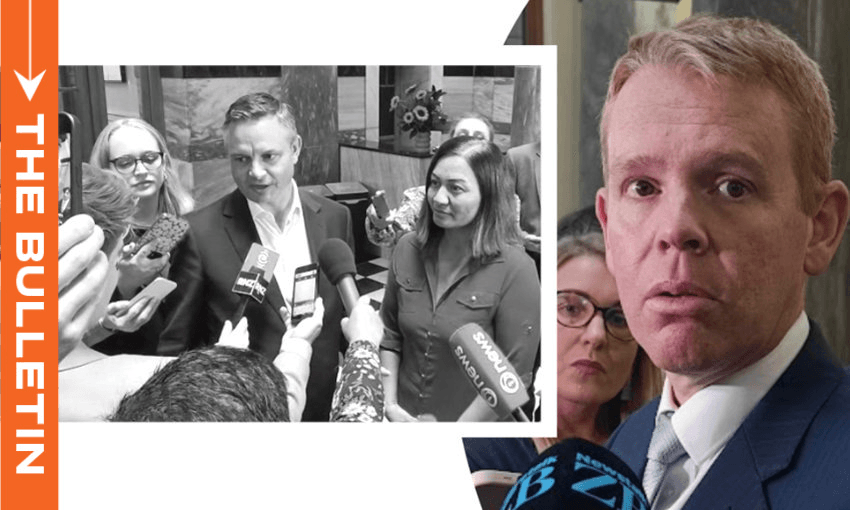Did the government allow itself to be too easily outflanked on the left, asks Catherine McGregor in this excerpt from The Bulletin, The Spinoff’s morning news round-up. To receive The Bulletin in full each weekday, sign up here.
Is Parker readying a leadership bid?
The gossip about Chris Hipkins messaging with new partner Toni Grace was the most shared tidbit from Andrea Vance’s merciless dissection of Labour’s loss (paywalled), but the real issues identified by a series of anonymous insiders ran much deeper. Blame is cast in all directions: from the “sluggish” response to the cost-of-living crisis in 2022, to the parliament occupation, to Jacinda Ardern’s “selfish” decision to quit. Among the more likely culprits is the abandonment of a wealth tax, which had been championed by then revenue minister David Parker. Now he’s gunning for Hipkins’ job, reports the Herald’s Thomas Coughlan (paywalled), who says Parker’s potential challenge is “far more advanced than Labour is publicly letting on”.
Labour has a Green Party problem – and vice versa
Another issue identified by Vance’s Labour sources is a perceived capitulation to the Green Party, particularly in the central Wellington seats (there’s an inside look at how the Greens won Wellington this morning in The Post, paywalled). “The Labour Party are acting like the handmaiden of the Greens,” one insider tells Vance. “We have not even attempted to give the Green-curious demographic – Gen Z, urban, younger voters – a reason to vote Labour over Green.” It’s an argument expanded on this morning in a must-read column by Ollie Neas. While the Greens are rightly celebrating their increased haul of MPs, the veneer of success is actually a mirage, he argues. The Greens and Labour are each caught in a catch 22: “Unless and until Labour veers left, the Greens have little hope of winning the radical changes that are central to their vision. But the diversion of left wing organising energy into the Greens prevents that shift from happening, leaving Labour hostage to the conservative, poll-obsessed factions that the Greens decry as sell-outs.”
The ‘Belgian waffle’ makes an unexpected return
On Sunday Vance was back with part two, this time looking at how National achieved victory. The party capitalised on the widespread mood for change with a “formidable, old-fashioned, ground game” and a disciplined approach to messaging, she reports. The campaign wasn’t without its stumbles, of course, including the controversy over its foreign buyers tax policy. Some spoken to by Vance blame former minister Todd McClay, “who they say was given responsibility to check for loopholes” in the policy. The man nicknamed the “Belgian waffle” (a reference to McClay’s years as a diplomat in Brussels) was demoted by Luxon but has since “relentlessly worked his way back in” – potentially all the way back into Cabinet. A Toddnaissance would be a surprise, but not half as big a shock as James Shaw joining a National government. That’s the prospect raised by Dileepa Foneska in BusinessDesk (paywalled), who thinks National will try to reach a “creative accommodation” with the Greens to make up for its lack of expertise in the climate change arena.
David Seymour and race relations: a shifting perspective
When a policy is as central to a party’s current identity as opposition to co-governance is to Act, it’s easy to assume it’s always been the case. Not so, says Eugene Bingham for the Sunday Star-Times (paywalled), in a story tracing David Seymour’s apparent change of heart on the Treaty and race relations. The David Seymour of 2014 sounded like “someone who is optimistic about the direction of Crown-Māori relations”, and “seeking to take Act in a different direction” from the racially divisive positions of former party leader Jamie Whyte, Bingham writes. Today, Seymour denies it’s him who’s changed; instead he says he’s responding to the troubling direction taken by state institutions, particularly the courts, over recent years. It’s an issue that Seymour passionately believes in, says commentator Ben Thomas, but that doesn’t mean the Treaty referendum is a non-negotiable: “There are always compromises to be made, that’s what politics is.”
